Interest rates - live: Bank of England hikes base rate for 10th time in row
The Bank of England has raised interest rates from 3.5 to 4 per cent - the tenth hike in a row.
But some experts think the Bank is heading towards the end of its cycle of rate hikes, bringing some potential relief to strained borrowers.
Markets expect the Bank’s monetary policy committee (MPC) to raise interest rates to 4 per cent, from the current rate of 3.5 per cent.
The decision comes after Bank governor Andrew Bailey provided some optimism for the future of the UK economy as he insisted the country has turned a corner on rising inflation.
He said earlier this month that while Britain still faces a recession, it could be “shallower” than previously expected, indicating a less severe downturn.
It comes after the International Monetary Fund (IMF) predicted the UK would be the only major economy to plunge into recession this year, with the economy set to contract by 0.3 per cent.
Key Points
Analysts expecting hike of 0.5 per cent
Base rate currently at 3.5%
Bank of England to announce decision on interest rates
‘Real national income is inescapably lower'
15:27 , Katy Clifton
Deputy Bank governor Ben Broadbent addressed the risks that employers raising staff wages could lock in high inflation.
He said: “Faced with this massive real income squeeze, which is a result of war and the pandemic, the attempt to claw that back – for firms to maintain the real value of their profits, and employees to maintain the real value of their wages – collectively, that’s not possible.
“Real national income is inescapably lower as a result of these shocks.
“It’s not that we intrinsically want lower real-wage growth – it’s that both wages and prices are telling us about the strength of this reaction, and ultimately the persistence of inflation.”
He added that employers “bidding each other up” does not ultimately make people better off.
Martin Lewis reveals what latest interest rate rise means for mortgage holders
14:30 , Matt Mathers
Financial expert Martin Lewis has responded to the Bank of England’s decision to raise interest rates to 4 per cent in a bid to tame sky-high inflation.
Mr Lewis, the Money Saving Expert founder, said the UK central bank’s tenth-rate hike in a row would result in further pain for some mortgage holders.
People who are on deals linked to the Bank’s base rate will face hundreds of pounds of additional costs, he said.
Writing on Twitter, Mr Lewis said: “Variable/tracker rate repayment mortgages will rise [around] £25/mth (£300/yr) per £100,000 of mortgage.
“Existing fixes won’t change. New fixed rates [have] already baked rises in.”
(1/2) NEWS: Bank of England base rate up 0.5% pts to 4.0%
- Variable/tracker rate repayment mortgages will rise c.£25/mth (£300/yr) per £100,000 of mortgage (use mortgage calc to check)
- Existing fixes won't change. New fixed rates've already baked rises in.— Martin Lewis (@MartinSLewis) February 2, 2023
Interest rates hike a ‘hammer blow to hardworking families'
14:15 , Emily Atkinson
The Liberal Democrats have described the raising of interest rates for the tenth consecutive time a “hammer blow to hardworking families across the country.”
Taking to Twitter on Thursday afternoon, the party said: “The blame lies squarely with this Conservative government whose botched budget last year sent our economy spiralling and who’ve completely failed to get inflation down.”
This is a hammer blow to hardworking families across the country.
The blame lies squarely with this Conservative Government whose botched budget last year sent our economy spiralling and who’ve completely failed to get inflation down.https://t.co/rwH08SJVdw— Liberal Democrats (@LibDems) February 2, 2023
How interest rate rise will affect property market and mortgages
14:00 , Matt Mathers
The Bank of England’s decision to hike interest rates to a 15-year high is set to see mortgage payments rise for millions of homeowners.
On Thursday, the Bank confirmed UK rates will rise for the tenth time in a row, to 4 per cent from 3.5, in a bid to control inflation after it reached a record 11.1 per cent in October.
The Bank has faced a tough call over what approach to take, as higher mortgage costs saw the housing market suffer five successive months of falls in property prices.
My colleague Will Mata has more details:

How interest rate rise will affect house prices and your mortgage
Impacts of Brexit hitting economy faster than expected, says BoE boss
13:38 , Emily Atkinson
Ben Broadbent, deputy governor for monetary policy at the Bank of England, said the impact of Brexit on the economy was coming through faster than first expected.
He said it was not clear if Brexit effects were a reason why the UK is forecasted to do worse than other major economies this year.
The International Monetary Fund (IMF) warned earlier this week that Britain would be the only major economy to see a contraction this year and the Bank said it also saw output for the UK this year being weaker than the eurozone or US.
Mr Broadbent said Brexit was one factor impacting the UK economy, but also a shrinking labour market, higher dependency on gas than other countries and a greater pass through of interest rates to borrowers.
Mr Broadbent said: “Brexit... has been something that has pulled on our potential output in our country and that’s been our assessment for many years.
“We’ve not changed our estimate of the long-running effects, but we’ve brought some of them forward and we think they’re probably coming in faster than we first expected.”
He added: “Yes it’s (Brexit) having some effect on growth, although ultimately no bigger effect than we assessed some years ago.
“Based on the numbers for trade and some degree for the numbers on investment, we think these effects are coming through faster than initially envisaged.”
Bank of England raises interest rates again in 10th consecutive hike
13:20 , Matt Mathers
The Bank of England has raised interest rates for the tenth time in a row lumping further pressure on mortgage borrowers.
Decision makers on the Bank’s Monetary Policy Committee (MPC) opted to hike the base rate from 3.5% to 4%, to help bring down double-digit inflation.
The Bank said that the UK is still headed for a recession, but stressed that the economic downturn could be shallower and shorter than previously expected.
Full report:

Bank of England raises interest rates again in 10th consecutive hike
Too soon to declare victory - Bailey
12:48 , Matt Mathers
Bailey adds that the Bank expects service sector inflation to keep rising in the “near term”.
He adds that while the Bank is confident inflation will come down, developments over the coming quarters will be “crucial” in determining by how much.
He adds consumer prices index (CPI) inflation is expected to fall below the Bank’s 2 per cent target rate in the spring of 2024, as long as energy prices fall as expected.
“It is too soon to declare victory just yet. Inflationary pressures are still there,” he added.
Inflation will be around 4% by end of year - Bailey
12:43 , Matt Mathers
Bailey said inflation would fall to around 4 per cent “by the end of the year”.
The governor warns, however, that the Bank’s concerns about inflation are not linked solely to energy prices.
He said other inflationary pressures are proving more difficult than expected.
He says the labour market remains tight and cites pay rises in the private sector.
‘Turning a corner'
12:38 , Matt Mathers
Bank of England governor Andrew Bailey is giving a press conference after announcing a 0.5 per cent hike in interest rates.
He said that the UK appears to be “turning a corner” in terms of inflation coming down. He says this has a lot to do with energy prices.
“Wholesale gas prices have fallen by around 50 per cent,” he says.
Reaction: Another blow for small businesses
12:09 , Matt Mathers
Caroline Plumb, CEO of Gravita, said the Bank’s decision to hike interest rates by another 0.5 per cent is a further blow for small businesses.
She said: “Another rise in interest rates makes a difficult situation even worse for small businesses. Many are already struggling with soaring energy prices, the impact of high inflation and uncertainty over the future of R&D tax credits and this latest hike is another blow during a tough time for SMEs. We could start to see a rise in insolvencies in the months ahead.
“Yet Britain’s entrepreneurs and the businesses they run are inherently resilient and often look back on times of economic turmoil as definitive moments.
“By having a full understanding of their cash flow, implementing comprehensive financial scenario planning and seizing opportunities for growth whenever they can, small companies will be in a prime position to bounce back when the economy begins to improve.”
Breaking: Bank confirms interest rise to 4%
12:04 , Matt Mathers
The Bank of England has raised interest rates from 3.5 to 4 per cent - the tenth hike in a row.
More follows...
Announcement expected imminently
11:58 , Matt Mathers
The Bank’s decision on interest rates is expected in a few minutes’ time.
We’ll be bringing you updates once the expected hike is announced plus reaction from the city and elsewhere.
Stay tuned for all the latest.
Days of cheap money are over - former bank policymaker
11:50 , Matt Mathers
The days of “ultra-low” interest rates and cheap money are over, a top economist has warned.
Michael Saunders, a former member of the Bank’s MPC, spoke to Bloomberg earlier ahead of today’s expected rate hike.
He said the conditions before this year were “exceptional” and that “inflation expectations are likely to be persistently higher, requiring a slightly higher nominal interest rate.”
Watch more of his comments below:
"The days of ultra low interest rates are behind us"
Former Bank of England policy maker Michael Saunders looks ahead to the central bank's decision with @flacqua https://t.co/i15FAPA8r2 pic.twitter.com/iz8AfycIYB— Bloomberg UK (@BloombergUK) February 2, 2023
When is the next decision on interest rates?
11:30 , Matt Mathers
Interest rates are set by the Bank’s Monetary Policy Committee, which has nine members.
They don’t always agree on how much the base rate should rise and the final decision is based on a majority vote.
We should find out how today’s vote went after the expected hike is announced.
The MPC meets eight times per year. Its next meetings are scheduled for the following dates:
23 March
11 May
22 June
3 August
21 September
2 November
14 December
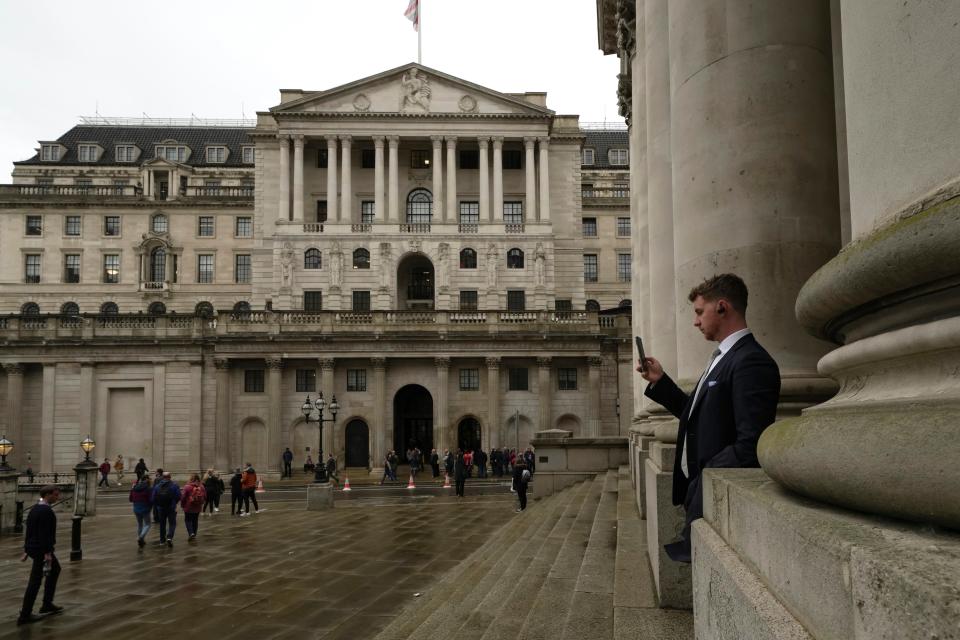
Can the government bring down inflation?
11:15 , Matt Mathers
In a speech earlier this year Rishi Sunak, the chancellor, said his government aims to halve inflation as he set out his five priorities for government.
The current rate of inflation is 10.5 per cent but Andrew Bailey, the Bank of England governor, said rising prices will likely fall “rapidly” this year.
The main lever used to bring down inflation is to raise interest rates, which makes it more expensive to borrow money and adds to things like mortgage costs.
It is hoped that, because people have less money in their pockets, this will dampen down demand in the economy and lead to lower prices.
Inflation has largely been driven by sky-high energy bills, which are starting to come down due to the falling price of wholesale gas and electricity.
Interest rates are set by the Bank of England, which is independent from the government.
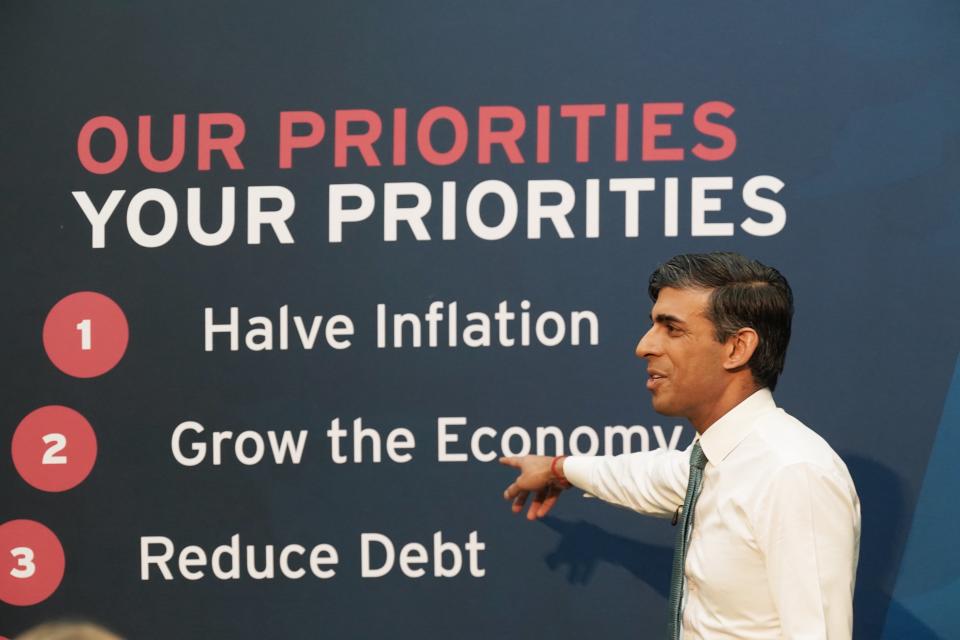
What are interest rates, and how do they affect inflation?
11:00 , Matt Mathers
We’ve been reporting a lot this morning about rising interest rates - but what exactly are they, how do they affect inflation and everyday life?
An interest rate is a measure that tells you how high the cost of borrowing money is, or how high the rewards of saving are.
Low interest rates are used to discourage people from piling up their money in savings.
High interest rates encourage saving because people get a better return for the money you are putting away.
More below:

All you need to know about interest rates and how they affect you
House prices to drop 10% this year - Santander
10:45 , Matt Mathers
High street lender Santander has warned house prices are set to tumble back to 2021 levels, and set aside more cash for bad debts as it braces itself for a possible rise in borrowers falling behind with repayments.
The Spanish-owned group is pencilling in a 10% fall in house prices this year as interest rate hikes knock homebuyer demand and a 1.3% contraction in the wider UK economy over 2023.
Its full-year figures showed the group put by £321 million in 2022, including a further £65 million in the fourth quarter, as an expected recession in the UK is set to weigh on borrowers, warning that the cost-of-living crisis could start to see customers fall into arrears.
This compares with £233 million of credit provisions being released in 2021.
Santander said: "We expect house prices to fall back to 2021 levels over the year ahead as higher base rates dampen demand."
It added: "The outlook remains uncertain as inflation has eroded real disposable income with the prospects of a recession ahead.
"These challenges for households and businesses are expected to continue into 2023 and could impact credit quality."
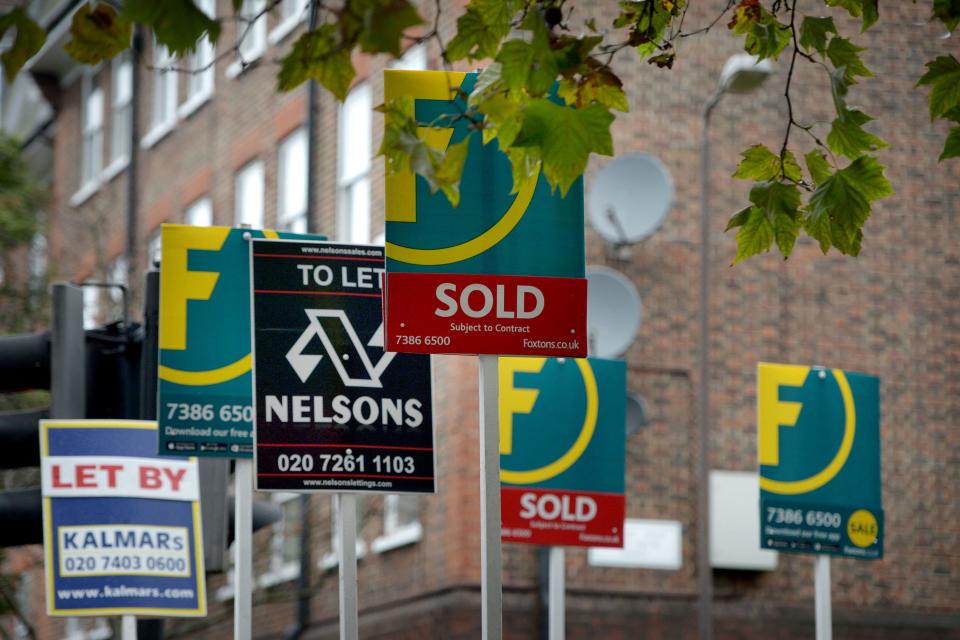
Australia announces decision to remove British monarchy from its banknotes
10:30 , Matt Mathers
In a move that spells the phasing out of the British monarchy on its currency notes, Australia has announced that its new $5 bill will not feature an image of King Charles III.
Australia’s Reserve Bank announced on Wednesday that a new design celebrating Indigenous culture will replace the previous portrait of the late Queen Elizabeth II.
The bank said that the decision is aimed at honouring “the culture and history of the First Australians”.
My colleague Sravasti Dasgupta reports:

Australia announces decision to remove British monarchy from its banknotes
Interest rate hike will hit borrowers hard
10:00 , Matt Mathers
William Marsters, senior UK sales trader at investment platform Saxo, said today’s expected Bank hike will be another below to borrows.
He said: “Today the Bank of England looks set to raise interest rates for the 10th time in a row, expected to be up from 3.5% to 4%.
“With inflation currently at 10.5% the Bank has been stuck between a rock and a hard place for a long time with little to no choice but to hike rates again with a target of reducing inflation to as low as 2%.
“This rise in interest rates has hit borrowers hard and those with large mortgages or credit card loans in particular will continue to feel the squeeze with the cost of living already tightening any kind of consumer purchasing power. Some homeowners have even decided to roll the dice and apply floating rates to their mortgages, taking the pain now in the hope that inflation will soon reduce and rates turn lower again later in the year.
“The UK is still likely to enter a recession in the coming months, something the BoE would have had to factor into their decision, and in the long term this should see consumer prices pressured, though many businesses will be negatively affected with costs already proving difficult to manage.”
What do rising interest rates mean for savers?
09:34 , Matt Mathers
Lucinda O’Brien, personal finance expert at Money.co.uk, has given her insight into what 2023’s interest rates mean for savers:
“Interest rates have soared on fixed-rate bonds over the past 12 months, making them far more rewarding for people with a lump sum to save.
“For the past few years, savings accounts haven’t had the headline interest rates that we have hoped for - until things started changing during a turbulent 2022.
“Amidst the cost of living crisis, inflation at a 40-year high and a September mini Budget that caused chaos, providers started to battle with each other by trying to produce the best rates to win customers. This meant we could finally start to see some return if we put our money into a savings account; especially with fixed-rate bonds.
“In January 2022 the average interest rate for a one-year fixed rate bond was 0.71%, but by the beginning of December 2022 it had risen to 3.61%.This month, the average interest rate for a one-year fixed rate bond stands at 3.59% - a slight decrease from December - but still a 406% increase from last year.
“In comparison, a five-year fixed rate bond had an average interest rate of 1.62% in January 2022 and 11 months later it had risen to 4.36%. These averages look at all fixed-rate bond accounts that include a minimum deposit of £500 or £1,000 and are open to any savers.”
ICYMI: UK economy to shrink more than Russia, predicts IMF
08:45 , Matt Mathers
Britain’s economy will have the worst performance of all G7 economies even sinking below Russia.
In its latest update published earlier this week, the International Monetary Fund (IMF) downgraded its UK forecast once again, predicting a contraction of 0.6 per cent against the 0.3 per cent growth pencilled in last October.
The grim outlook for the year ahead puts the UK far behind counterparts in the G7 and the only country – across advanced and emerging economies – expected to suffer a year of declining GDP.
My colleagues Adam Forrest and Thomas Kingsley report:

UK economy to shrink more than Russia, predicts IMF
US Fed hikes rates by further 0.25%
08:30 , Matt Mathers
The UK is not alone in raising interest rates in a bid to tame sky-high inflation.
Policymakers across the pond have also been hiking rates and the Federal Reserve yesterday announced a further quarter point rise.
The Fed’s latest hike brings that Federal funds rate to a range of 4.50 per cent to 4.75 per cent.
Cora Lewis takes a look at what the Fed hike means for Americans.

Here's what the Fed interest rate hike means for you
Record profits of £68.1 bn for Shell
08:06 , Matt Mathers
The profits of energy companies have been coming under close scrutiny of late as they continue to make huge profits due to increased demand coming out of the Covid pandemic and Vladimir Putin’s illegal war in Ukraine, which drove up the price of oil and gas.
The government introduced a windfall tax on oil and gas giants to help people pay their energy bills, although some companies have got away with paying little or nothing due what the Labour Party described as a “loophole” in the legislation.
In October last year, the BBC reported that Shell had paid zero in the windfall tax. The firm said it only expected to start paying the levy this year.
Today, Shell has posted the biggest profits in its history. Profits increased by 53 per cent to 84.3 billion dollars (£68.1 billion) in 2022.
Shell chief executive Wael Sawan said: “Our results in Q4 and across the full year demonstrate the strength of Shell’s differentiated portfolio, as well as our capacity to deliver vital energy to our customers in a volatile world.
“We believe that Shell is well positioned to be the trusted partner through the energy transition.
“As we continue to put our Powering Progress strategy into action, we will build on our core strengths, further simplify the organisation and focus on performance.
“We intend to remain disciplined while delivering compelling shareholder returns, as demonstrated by the 15 per cent dividend increase and the four-billion-dollar share buyback programme announced today.”
My colleague Sam Rkaina has the story:

Shell profits hit another record high amid cost of living crisis
How is the pound performing ahead of expected hike?
07:55 , Matt Mathers
The FTSE 100 closed down again on Wednesday as it continued a recent retreat from its four-year highs in mid-January.
The index fell by 10.59 points, ending the day at 7,761.11, a drop of a little over 0.1% which was influenced by pharma giant AstraZeneca and some of the biggest mining companies in the world.
The falls came as traders look towards interest rates decisions from the US Federal Reserve, and the Bank of England, which reports at midday on Thursday.
More below:

FTSE in the red ahead of Bank rates decision
Housing markets continue to cool ahead of Bank announcement
07:44 , Matt Mathers
Yesterday Nationwide, one of the country’s biggest mortgage lenders, said that average UK house prices had slumped for the fifth month in a row in January, down to 0.6 per cent.
The UK’s housing market has been cooling in recent months following record growth during the Covid pandemic.
Prices have been falling due to a combination of inflation, the general cost of living squeeze and rising interest rates.
When the Bank first started raising rates last autumn in the aftermath of Liz Truss’s mini-Budget, mortgage lenders began hiking their prices, making it more expensive to buy a house, which dampened down demand in the market.
And although mortgage rates are starting to come down they remain well above where they were last year. Few lenders are offering deals below 4 per cent - many had previously been offering customers in the region of 2 per cent.
Meanwhile, some mortgage holders whose deals are linked to the Bank’s base have also seen their costs increase - in some cases - by hundreds of pounds.
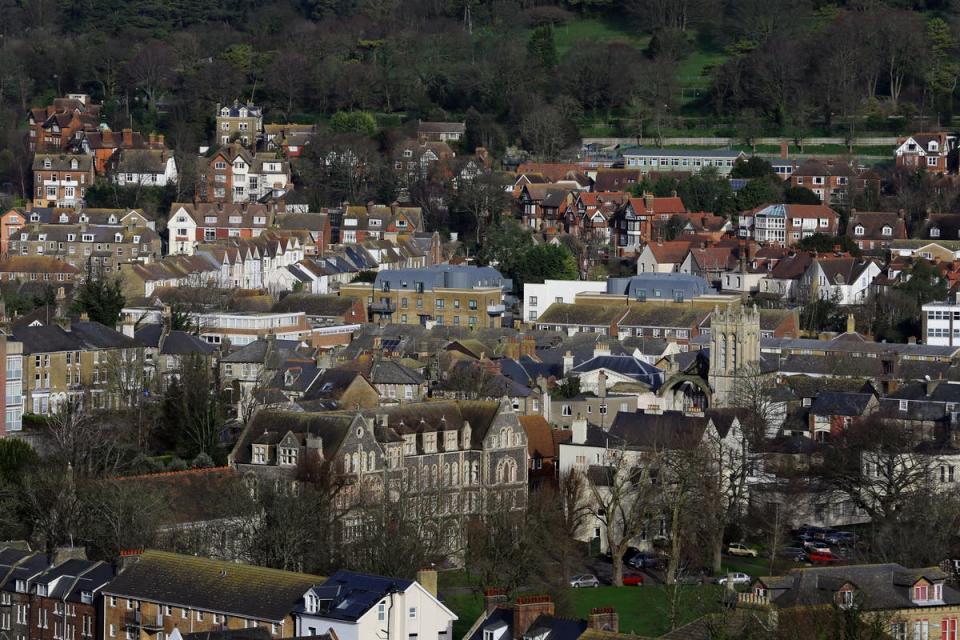
Average UK house price falls again in January
Vote on interest rates could be split
07:29 , Matt Mathers
Analysts believe that the Bank’s policymakers could be split on their decision on interest rates today.
The Monetary Policy Committee (MPC) has nine members - the Bank governor, the three deputy governors for monetary policy, financial stability and markets and banking, the chief economist and four external members appointed directly by the chancellor.
Committee members vote on whether they think the base rate should rise - and by how much. But they do not always agree.
Experts say some members of MPC could opt for a smaller hike to 3.75 per cent, or no increase at all.
A decision is made based on a majority of votes.
But the tide could be set to turn imminently, with some economists suggesting the decision will mark the penultimate base rate rise.
Interest rates could peak at 4.5 per cent or 4.25 per cent next month, before coming back down.

UK markets sink amid grim growth forecasts for inflation-hit Britain
07:00 , Emily Atkinson
UK markets slipped into the red on Tuesday after a stark report from the International Monetary Fund (IMF) warned that Britain will be the only major economy to plunge into recession this year.
The grim forecast from the group predicted that the UK will lag behind its counterparts in the G7 group of advanced nations, with even sanction-hit Russia expected to grow this year.
London’s leading indices all suffered losses on Tuesday with the gloomy outlook hitting investor sentiment.

UK markets sink amid grim growth forecasts for inflation-hit Britain
What does inflation mean for you?
06:00 , Emily Atkinson
The present spike means that the price of everyday items like staple foods, fuel, clothing, shoes and furniture have all climbed over the last year, a development that threatens to hit low-income families hardest at a time when they can least afford it.
Joe Sommerlad has more:

What does inflation mean for you?
Britain’s high streets face another tough year as spending remains weak
05:00 , Emily Atkinson
Britain’s consumer economy is still awaiting the “latent spending power” built up during the pandemic, writes James Moore.

Britain’s high streets face another tough year as spending remains weak
The easy mistakes to avoid on your tax return as Martin Lewis issues warning
04:00 , Emily Atkinson
The deadline for submitting tax returns is fast approaching.
While those sending their returns to HMRC on paper have been able to relax since Halloween night, the bulk of digital filers are doomed to spend the days before 31 January with a cloud of calculations hanging over their heads.
Punishments for those who put it off too long can be crushing. Even those who need to file returns but have no tax to pay must submit theirs in time or face an initial £100 fine.
Liam James covers the unfortunate mistakes taxpayers can easily make:

The easy mistakes to avoid on your tax return as Martin Lewis issues warning
Tesco squeezes store managers as food price inflation soars
03:00 , Emily Atkinson
There’s trouble at the Tesco mill, writes James Moore. Britain’s biggest supermarket has just announced “store changes helping us to remain competitive”.
Are we ever going to see a straightforward announcement?

Tesco squeezes store managers as food price inflation soars
Watch: UK economy set to shrink in 2023 in weakest performance among G7, IMF warns
02:00 , Emily Atkinson
Rents hit record high amid ‘highest increases for decades’
01:00 , Emily Atkinson
The average monthly rent being asked of new tenants across Britain, excluding London, has reportedly hit a record £1,172 per month.
Vicky Shaw reports:
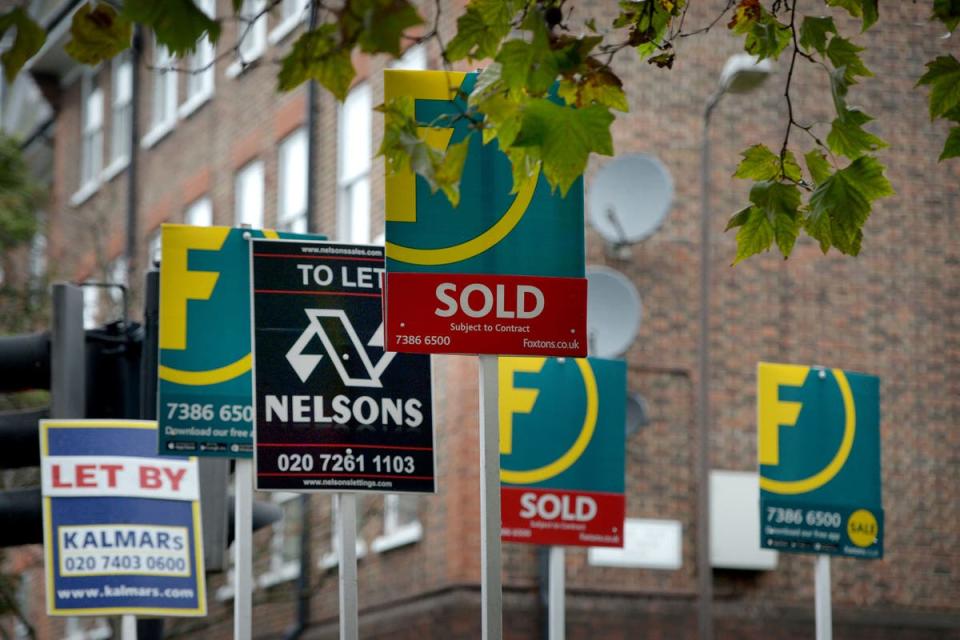
Rents hit record high amid ‘highest increases for decades’
Bad news for borrowers: Bank of England likely to impose another 0.5 base rate hike
00:00 , Emily Atkinson
Borrowers look set to take another hit on Thursday. UK base rates currently stand at 3.5 per cent. The City is betting that the Bank of England’s rate-setting Monetary Policy Committee (MPC) will impose a 0.5 percentage point rise to 4 per cent.
James Moore has the details:

Bad news for borrowers: Bank of England set to impose another 0.5 base rate hike
Average UK house price falls again in January
Wednesday 1 February 2023 23:00 , Emily Atkinson
The average UK house price has fallen for the fifth month in a row – dropping by 0.6 per cent in January – according to one of the country’s biggest mortgage lenders, Nationwide.
Annual house price growth also slowed to 1.1 per cent, from 2.8 per cent in December. The typical property value is now 3.2 per cent lower than the peak seen last August.
The average UK house price in January 2023 was £258,297. The annual growth rate of 1.1 per cent is the lowest since the early months of the coronavirus pandemic, in June 2020, when house prices fell by 0.1 per cent annually.

Average UK house price falls again in January
Signs that the UK economy could be recovering better than expected
Wednesday 1 February 2023 22:00 , Emily Atkinson
A sharp fall in energy costs and the predicted slashing of inflation means the UK’s economy could be faring better than feared, experts say.
Millions of people have been struggling with the toughest economic situation in recent memory, with soaring bills and slow growth amid forecasts of a prolonged recession.
But there could be good news on the horizon as we begin to see some green shoots of recovery that could give much-needed reprieve following the squeeze on household budgets.
Sukhmani Sethi reports:

Signs that the UK economy could be recovering better than expected
Interest rates set to rise again as Bank of England braces for ‘shallow’ recession
Wednesday 1 February 2023 21:18 , Sam Rkaina
The Bank of England is expected to push interest rates higher on Thursday for the 10th time in a row.
But some experts think the Bank is heading towards the end of its cycle of rate hikes, bringing some potential relief to strained borrowers.
Markets expect the Bank’s monetary policy committee (MPC) to raise interest rates to 4 per cent on Thursday, from the current rate of 3.5 per cent.

Interest rates set to rise again as Bank of England braces for ‘shallow’ recession

